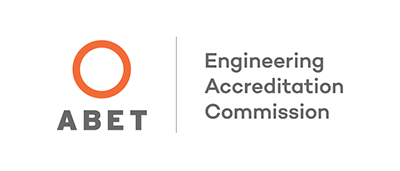- Home |
- Accreditation
Accreditation
The B.S. program in Chemical Engineering is accredited by the Engineering Accreditation Commission of ABET, https://www.abet.org, under the General Criteria and Program Criteria for Chemical, Biochemical, Biomolecular, and similarly named engineering programs.

Program Mission
The mission of the Swalm School of Chemical Engineering is to produce graduates who have the ability to apply the principles of the physical sciences, together with the principles of economics and human relations, to fields that pertain directly to processes and process equipment that treat material to effect a change in state, energy content, or composition.
Graduates will receive a broad education that will enable them to become leaders in industry, the profession, and the community. Those graduates that excel academically will be prepared for entry to graduate studies.
To achieve our mission, Program Educational Objectives have been established to help us assess the degree to which we have achieved these objectives.
Chemical Engineering Program Objectives
Mississippi State University Chemical Engineering graduates will
- Successfully enter the chemical engineering profession as design, process and research engineers (and related designations) with prominent companies in the chemical process industries, energy, environmental, government agencies, consulting or other related industries.
- Apply communication and engineering technical skills to the field of chemical engineering to enhance economic development and address technical issues facing industry, academia and the government.
- Pursue post-baccalaureate degrees in chemical engineering and related fields, business and professional programs including medicine and law.
- Demonstrate proficiency in chemical engineering practice and leadership development by advancing in their chosen fields to technical leadership, supervisory and management positions.
- Enter their chosen fields maintaining the highest degree of ethical conduct and safety responsibility.
(Revised November 2022)
Chemical Engineering Student Outcomes
Student outcomes for Swalm School of Chemical engineering graduates are as follows:
1. an ability to identify, formulate, and solve complex engineering problems by applying principles of engineering, science, and mathematics
2. an ability to apply engineering design to produce solutions that meet specified needs with consideration of public health, safety, and welfare, as well as global, cultural, social, environmental, and economic factors
3. an ability to communicate effectively with a range of audiences
4. an ability to recognize ethical and professional responsibilities in engineering situations and make informed judgments, which must consider the impact of engineering solutions, in global, economics, environmental, and societal contexts
5. an ability to function effectively on a team whose members together provide leadership, create a collaborative and inclusive environment, establish goals, plan tasks, and meet objectives
6. an ability to develop and conduct appropriate experimentation, analyze and interpret data, and use engineering judgment to draw conclusions
7. an ability to acquire and apply new knowledge as needed, using appropriate learning strategies
The outcomes relate to the abilities, skills, and attributes that the graduates of our program will need to be competitive in the chemical engineering profession. These outcomes are benchmarks continuously improving course materials and for evaluating the need for change or improvement of the curriculum.
The B.S. program in Petroleum Engineering is accredited by the Engineering Accreditation Commission of ABET, https://www.abet.org, under the General Criteria and Program Criteria for Petroleum and similarly named engineering programs.

Petroleum Engineering Program Objectives
Derived from needs and input of industry representatives, alumni, students and faculty, the Petroleum Engineering Program Objectives have been developed to describe achievements expected by our graduates over time in professional practice. Consistent with the institutional mission of Mississippi State University, the Program Educational Objectives are presented below.
Mississippi State University Petroleum Engineering graduates will
- Obtain gainful employment and hold positions of increasing responsibility in the field of Petroleum Engineering as a Reservoir, Production, Data Analytics, Drilling, or Field engineer.
- Apply effective communications, leadership and teaming skills in the field of petroleum engineering in industry, academia or government.
- Demonstrate continuing improvements in technical skills through professional development and training, professional licensure, or appropriate certification.
(Revised November 2022)
Petroleum Engineering Student Outcomes
Student outcomes for Petroleum Engineering graduates are as follows:
1. an ability to identify, formulate, and solve complex engineering problems by applying principles of engineering, science, and mathematics
2. an ability to apply engineering design to produce solutions that meet specified needs with consideration of public health, safety, and welfare, as well as global, cultural, social, environmental, and economic factors
3. an ability to communicate effectively with a range of audiences
4. an ability to recognize ethical and professional responsibilities in engineering situations and make informed judgments, which must consider the impact of engineering solutions, in global, economics, environmental, and societal contexts
5. an ability to function effectively on a team whose members together provide leadership, create a collaborative and inclusive environment, establish goals, plan tasks, and meet objectives
6. an ability to develop and conduct appropriate experimentation, analyze and interpret data, and use engineering judgment to draw conclusions
7. an ability to acquire and apply new knowledge as needed, using appropriate learning strategies
The outcomes relate to the abilities, skills, and attributes that the graduates of our program will need to be competitive in the petroleum engineering profession. These outcomes are benchmarks for continuously improving course materials and student performance and for evaluating the need for change or improvement of the curriculum.
* Bagley College of Engineering Enrollment Data
Data from Office of Institutional Effectiveness website.
Enrollment data permanent site.
Graduation data permanent site.
